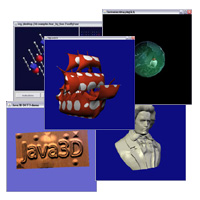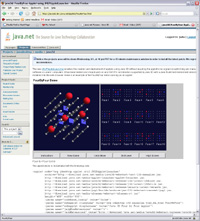|
|
java3d
|
| Summary | Master project for Java 3D projects |
|---|---|
| Categories | None |
| License | *Other* |
| Owner(s) | jada, kcr, paulby |
Quick Links: Documentation | Downloads | License | How to Contribute | Reporting Issues | Feedback and Discussion | Project Highlights | Examples | Links
This is the parent project for all Java 3DTM-related sub-projects on java.net. These sub-projects include: j3d-core (the core Java 3D API), vecmath (the 3D vector math package), and j3d-core-utils (the Java 3D core utilities), among others. See the complete list of sub-projects at the bottom of this page.
Note that there is no source code in this parent project; source code files for Java 3D-related sub-projects are in the sub-projects themselves.
 Launch
Java 3D
demo applications
from your browser (via Java Web Start). Launch
Java 3D
demo applications
from your browser (via Java Web Start). |
 Run Java 3D demo applets
right in
your browser (via Java Plug-in). Run Java 3D demo applets
right in
your browser (via Java Plug-in). |
The following projects were demonstrated at the Java 3D pod at JavaOne 2007.
|
Contributed by: Dr. N. Vaidya |
Contributed by: The Project Wonderland Team @ Sun Microsystems, Inc. |
|
Contributed by: Alessandro Borges. |
API Documentation
Click on the desired link below to browse the API documentation for various releases.
Current release:
Previous releases:
Daily builds:
Wiki &
FAQ
The Java 3D
Wiki is a set of collaborative web pages to which members of
the
Java 3D community can contribute. It includes a list of Frequently
Asked Questions (FAQ).
Java 3D binary downloads are available on java.net. Three types of builds are provided: Release (or FCS) builds; Stable (experimental, early access) builds; and Daily builds.
The source code for the j3d-core-utils
and j3d-examples
projects is
licensed under the open source Berkeley Software Distribution (BSD)
License.
The source code for the j3d-core and vecmath projects is licensed under the Java Research License (JRL) for non-commercial use. The JRL allows users to download, build, and modify the source code in the j3d-core and vecmath projects for research use, subject to the terms of the license.
The source for these two projects is also licensed for
commercial
use under a no-fee Java
Distribution License (JDL).
The JDL allows commercial use of Java 3D and vecmath with or
without
modification, as long as compatibility with the entire API
Specification is maintained. This includes passing the Java 3D
Technology Compatibility Kit (TCK).
Projects other than the four named above are licensed under
terms
defined by the particular sub-project.
We invite developers to contribute to Java 3D. Please refer to the Contributing to Java 3D page to learn how to contribute to any of the Java 3D subprojects. See the JavaDesktop Community Governance Guidelines for general guidelines on participating in JavaDesktop community projects, such as Java 3D.
Please use the Issue
Tracker
in this project to track issues (bugs, feature requests, etc.) for
Java 3D-related
sub-projects. The following subcomponents exist in the java3d project's
Issue Tracker:
Before filing a new issue, please check to see if your issue has already been reported: search the "summary" fields of open bugs in the Issue Tracker system. If you're new to Issue tracking, you might want to take a moment to browse these introductory docs:
We have created four Java 3D mailing lists in this project: interest 'at' java3d.dev.java.net, announce 'at' java3d.dev.java.net, issues 'at' java3d.dev.java.net, and cvs 'at' java3d.dev.java.net (replace 'at' with @). Click here to subscribe to any of these lists. The interest list is an open mailing list for discussing all aspects of Java 3D, the reference implementation for the Java 3D core, vecmath, utilities, example programs, etc. The annouce list is a low-volume moderated mailing list for announcing Java 3D-related news and information. The issues list is for automated issues tracking, and the cvs list is for automated CVS change messages (for changes to the parent java3d web pages only).
For those who prefer a forum to a discussion mailing list, we
have
created the
Java 3D
forum,
hosted as
part of the JavaDesktop Community.
Messages
posted on the forum are cross-posted to interest
'at' java3d.dev.java.net
and vice-versa.
Finally, each sub-project has its own cvs mailing
list. The cvs lists are for automated CVS change messages and
discussion of those
changes.
Release project Source code
The Java 3D source
code is available for download from the CVS repositories of the j3d-core, j3d-core-utils, and vecmath projects.
The trunk of each CVS repository is a pre-release version of
Java 3D 1.5.2. A Java 3D 1.6 / 2.0 development
branch, dev-1_6, will soon be available in
the CVS repositories. For a
description of the CVS tags used in these projects, please refer to "Using CVS Tags in
Java 3D Projects".
Java 3D 1.5
The Java 3D 1.5 API is defined by JSR-926, a Maintenance Release under the Java Community Process (JCP). The highlights of the 1.5 and 1.5.1 releases are on our Wiki. See the Version 1.5 Change Log on the JSR page for a complete list of API changes.
Java 3D
1.6, 2.0, ...
See the Java 3D Roadmap Wiki page for a set of proposed changes for 1.6 (and beyond). We encourage members of the development community to review this proposed set of changes and provide feedback. You can also find ideas for community contributions on this page.
The j3d-examples project includes a set of simple example programs. The Java 3D Fly Through v 2.0 Beta sample application shows you how to take advantage of the capabilities of Java 3D technology. You can download the source code via http://java3d.netbeans.org.
Click here to run Java 3D demos right in your browser with no setup required (via Java Web Start).
Sun-Sponsored Links
Other Links
| Name | Summary |
|---|---|
| j3d-contrib-utils | Contrib (optional) utilities for Java 3D |
| j3d-core | The Java 3D API Core |
| j3d-core-utils | Core Utils for Java 3D |
| j3d-examples | Java 3D Example Programs |
| j3d-incubator | Java 3D Incubator Project |
| j3d-optional-utils | Java 3D Optional Utilities |
| j3d-vrml97 | Java 3D VRML97 Loader |
| j3d-webstart | Java 3D Web Start Binaries |
| j3dfly | J3DFly and J3dEditor sample applications |
| skinandbones | Real time mesh deformation using skeletons. |
| vecmath | The vecmath package |
| vecmath-test | JUnit tests for the vecmath package |